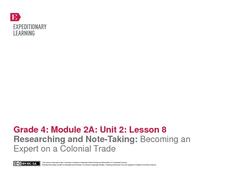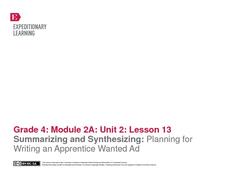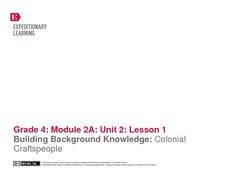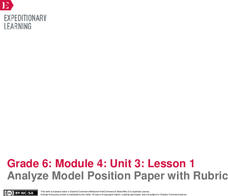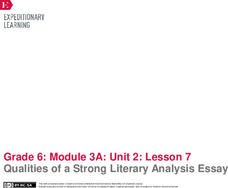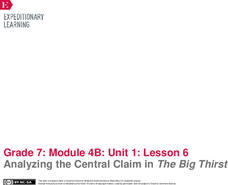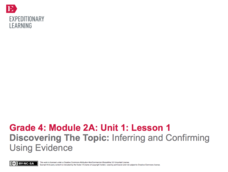EngageNY
Researching and Note-Taking: Becoming an Expert on a Colonial Trade
Fourth graders work in small groups to become experts on different colonial trades in the eighth instructional activity of this unit. Working toward the long-term goal of writing a piece of historical fiction, young scholars read...
EngageNY
Documenting Research: Sorting and Recording Information About the Wheelwright
Fourth graders practice using a graphic organizer to record their notes and answer text-dependent questions while supplying evidence of how they found their answer. They focus on a machine called the wheelright, which was commonly...
EngageNY
Science Talk: How do Bullfrogs Survive
Following the reading of the book Bullfrog at Magnolia Circle, the ninth lesson in this unit involves emerging experts in a science talk about how bullfrogs survive. Looking back through the text, young scholars prepare for the...
EngageNY
Summarizing and Synthesizing: Planning for Writing an Apprentice Wanted Ad
In instructional activity 13 of this unit on colonial trade, young researchers learn about apprentices as they prepare to write help-wanted ads for the specific trade they have been researching. To begin, the class listens closely as the...
EngageNY
Building Background Knowledge: Colonial Craftspeople
In the first lesson plan of this unit on colonial trade, fourth graders gain background knowledge of different jobs performed by early colonists. The class begins with a slide show presentation that includes a variety of great...
Curated OER
Oil Crisis: What Would You Do?
The dynamics between the economies and politics of the United States and the Middle East are here to study. Upper graders read and discuss scenarios relating to OPEC and the current oil crisis, then in small groups role-play members of...
EngageNY
Individual Research
Seventh graders get the option of choosing their own text from a selection to read and gather more information as part of their research. Learners discuss the difference in reading for research and reading for pleasure. They also begin...
EngageNY
Analyze Model Position Paper with Rubric
It's time to choose a position! Scholars read a model position paper about fracking to practice identifying the topic and argument. Then, working with a partner, they use a rubric to assess the essay.
EngageNY
Module Reflection and Writing Book Reviews
Scholars take time to reflect on the unit and the end-of-unit writing assessment. They use a Working Conditions Reflection to help guide them through the exercise. Readers then begin working on a book review for the book they have...
EngageNY
Qualities of a Strong Literary Analysis Essay
Read like a writer. Scholars read a model literary analysis in preparation for a similar writing assignment before annotating each paragraph for the gist. Next, pupils devise a list of qualities of a strong literary analysis essay.
EngageNY
Deepening Your Research
Give credit where credit is deserved. Scholars discuss what makes a credible source as they take a look at "An Apparel Factory Defies Sweatshop Label, but Can It Thrive?" Learners read the article to look for answers to the research...
EngageNY
Research: Identifying Categories for Our Research About the Wheelwright
Here is a fine lesson plan on reading and understanding expository text designed for 4th graders. With a partner, learners read a passage of text about a machine called a wheelright. This machine was commonly used in the...
EngageNY
Revising: Strong Conclusions for My Accessing Books Around the World Informative Paragraph
It's important that writers leave their readers with a strong and satisfying conclusion. Help your young writers develop the skills to compose a concluding sentence with the steps outlined here. After class members have had a chance to...
EngageNY
Analyzing the Central Claim in The Big Thirst
Quench the class's thirst for knowledge while building analytical skills. Scholars listen as the teacher reads excerpt from the book The Big Thirst. They then complete a close read and answer text-dependent questions from pages one...
EngageNY
Introducing Module 4B: “Water Is Life”
Learners take a gallery walk around the classroom to view various images and quotes. As they walk, they write down what they notice and wonder about what they see. After discussing their notice and wonder notes, they read the...
Maine Content Literacy Project
Introduction to The Lottery, by Shirley Jackson
"The Lottery" by Shirley Jackson is a great story to share with your class, and this instructional activity focuses on just that story! The eighth in a fourteen-instructional activity series on short stories, the plan has learners...
EngageNY
Structuring The Search: Categorizing Our Research
What can you contribute? Scholars read text to determine how ants contribute to the rainforest. First, they categorize and sort facts gathered from reading. Next, readers focus on specific terms in each paragraphs of the text Ants by...
EngageNY
Discovering the Topic: Inferring and Confirming Using Evidence
Allow your class to figure out what they will be studying through an inquiry-based anticipatory set that involves analysis of mystery documents and practice with making inferences. The lesson plan document includes a detailed description...
EngageNY
Writing a First Draft: Accessing Books Around the World Informative Paragraph
Supervise the final drafting of a well-organized paragraph by following the steps outlined in this plan. Using the included sample paragraph as a model, class members brainstorm criteria for quality work and then compose their paragraphs...
EngageNY
Revising My Accessing Books Around the World Informative Paragraph for a Hook to Captivate My Reader
While this is considered optional within the unit it is designed for, pupils would benefit from the listed activities. Working on writing and revising a paragraph about librarians who travel to isolated areas, class members can add some...
EngageNY
Analyzing the Structure and Content of an Essay to Inform
Outlines are a great asset to essay planning. Scholars read and analyze a model essay about the importance of daily reading and consider how it would look in an outline format. Next, they outline their own informative essays about rules...
EngageNY
Revision and Illustration: Strengthening the Writing in my Rainforest Field Journal and Adding a Labeled Drawing
Let me draw you a picture. Scholars read a quote from Roger Tory Peterson and discuss his views on drawings. They then create their own drawings of an ant or butterfly to add to their science journals.
EngageNY
Relationships Between Key Scientific Concepts: Planning What Causes Earthquakes
That is ground shaking news! Scholars read Earthquake in multiple reads to determine the gist, identify cause and effect relationships, and understand vocabulary. Learners complete graphic organizers to describe what happens before and...
EngageNY
Researching about the Red Cross: What Is a Multinational Aid Organization?
Lend a helping hand. Pupils read two informational articles about international aid organizations and how they help areas affected by natural disasters. Scholars attempt to uncover the gist of each text, discussing their thoughts in...


